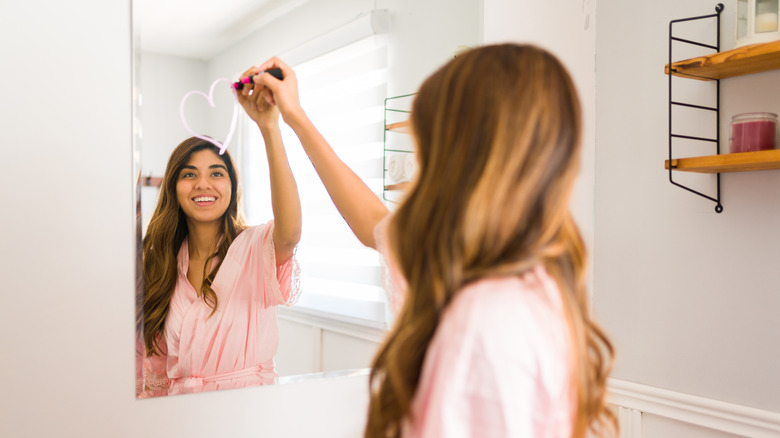Why A Fixation With Self-Love Might Be Making Us Lonely
The concept of self-love has grown increasingly convoluted in recent years. Part of that can be attributed to it being such a broad concept. At a basic level, self-love means knowing your worth so nobody can take you for granted or mistreat you. In a broader sense, it means being kind to yourself and accepting your flaws and quirks. It can also mean putting your own needs and happiness first. And while there's no doubt that self-love can help you lead a happier life, our modern-day definition of the concept is drastically different from what it should be.
Companies now rather cynically use the concept of self-love to market their products, telling us that if we love ourselves, we should treat ourselves to their stuff. Beauty and skincare brands are especially notorious for advertising their products in this light. They make us believe that if we purchase their expensive self-love skincare package, all our insecurities will disappear, and we'll be able to love ourselves without any doubts.
This leads to the misconception that loving yourself equates to never acknowledging your shortcomings or working to change yourself because you're perfect the way you are. Self-love can be a nuanced concept where you can love yourself for who you are and still want to work towards a better version of yourself. Given all of these different interpretations, it's unsurprising that self-love has the potential to be counterproductive.
Self-love can be quite lonely
There's a fine line between self-love and self-obsession. When you practice true self-love, you show compassion for yourself, but you also leave some for other people too. But, when you're self-obsessed, you end up becoming less empathetic towards others because your problems always take precedence over theirs. Prioritizing your needs and learning when to say no are important for living a happier life, but it can be a double-edged sword.
On the one hand, you're doing what makes you feel good and putting yourself first, but on the other, you're distancing yourself from good relationships. Of course, the people who care about you should understand your reasons, but any healthy relationship is a two-way street. They require effort on both sides to maintain. Remember, this only applies to relationships you want to nurture. In these situations, striking a balance is imperative.
If an activity or person makes you feel bad about yourself, say no without guilt, but don't turn down every opportunity to hang out with the people you care about in the name of self-love. Social media messaging has led us to suppress our desires to find love by telling us we don't need anybody else. And while that may be the case for some, for those looking for love, it can give them the idea that making an effort to look for it is pointless because you can just love yourself, which only leads to loneliness.
Practice self-love the right way
Self-love can also lead to loneliness for a good cause. If you know your worth and love yourself, you won't take any less than you deserve. You're less likely to stick around in a toxic relationship because you don't truly rely on external sources to receive validation. When you love yourself, you might not be keen to rush into a bad relationship to feel loved. And, while self-love can sometimes isolate you from the people you care about, it can also give you the space to figure out who you want to prioritize in your life.
Rest assured that you can love yourself and others simultaneously as long as you know how to protect yourself from toxic people. Instead of focusing on social media's false self-love, cultivate a self-care routine that actually helps you. Sometimes, the easiest way to show kindness to yourself is by simply speaking positively to yourself. Accept your mistakes as all part of being human. Give yourself little compliments and appreciate every accomplishment no matter how small.
At the end of each day, write down a few things you're grateful for to develop a more positive attitude toward life. And, if comparison is the thief of your joy, limit social media use. Naturally, setting clear boundaries is easier said than done. When in doubt, consider this simple advice that licensed clinical psychologist Alexandra Solomon, Ph.D., gave Self: "I recommend making relational and sexual choices that center around pleasure, comfort, safety, and communication."


